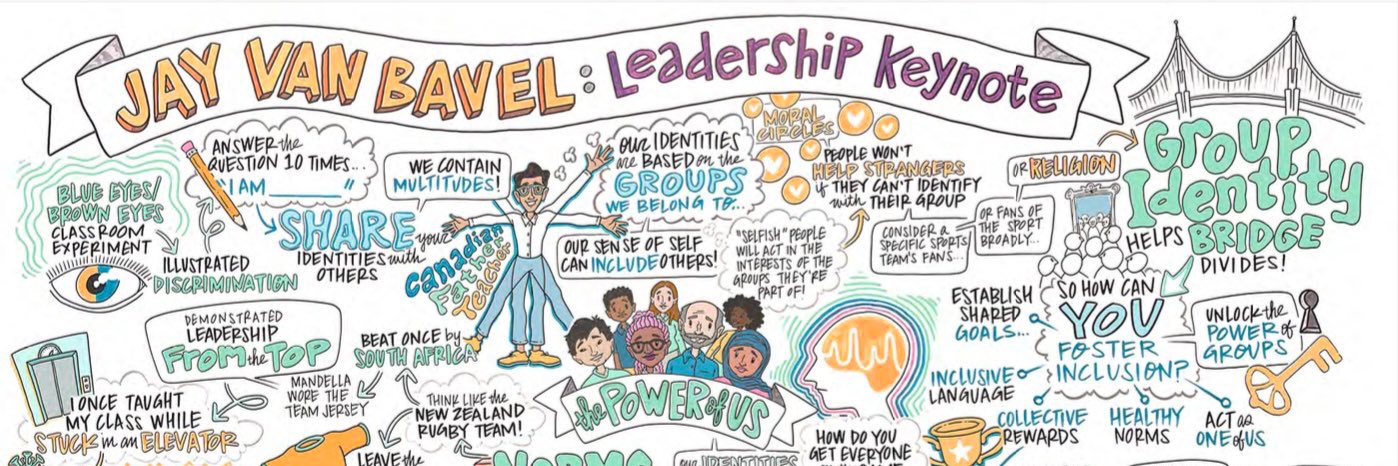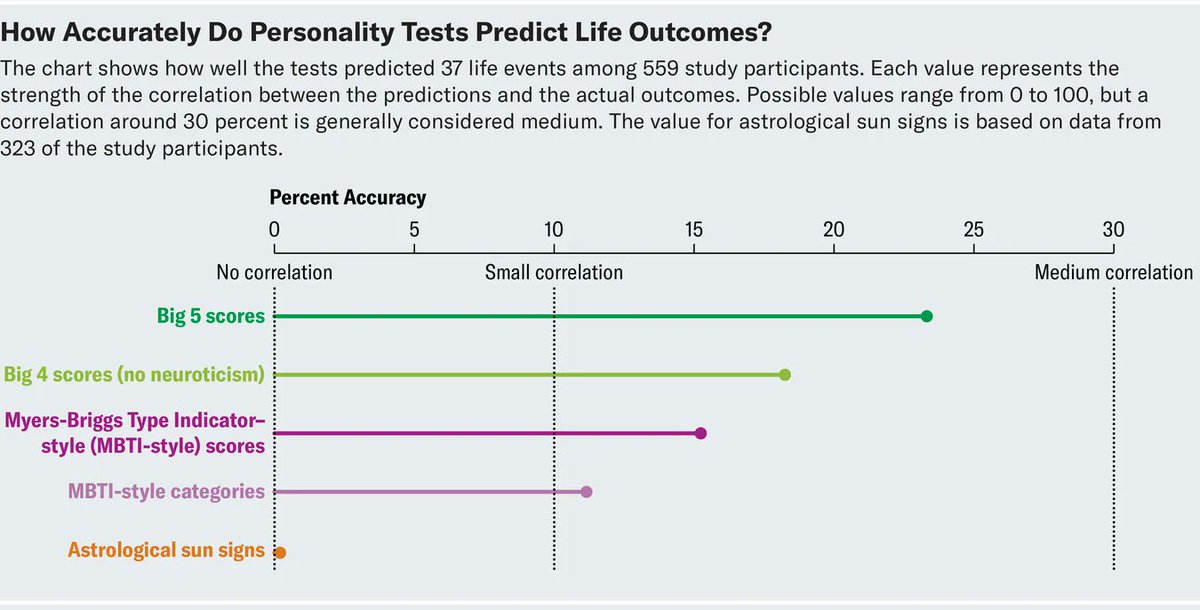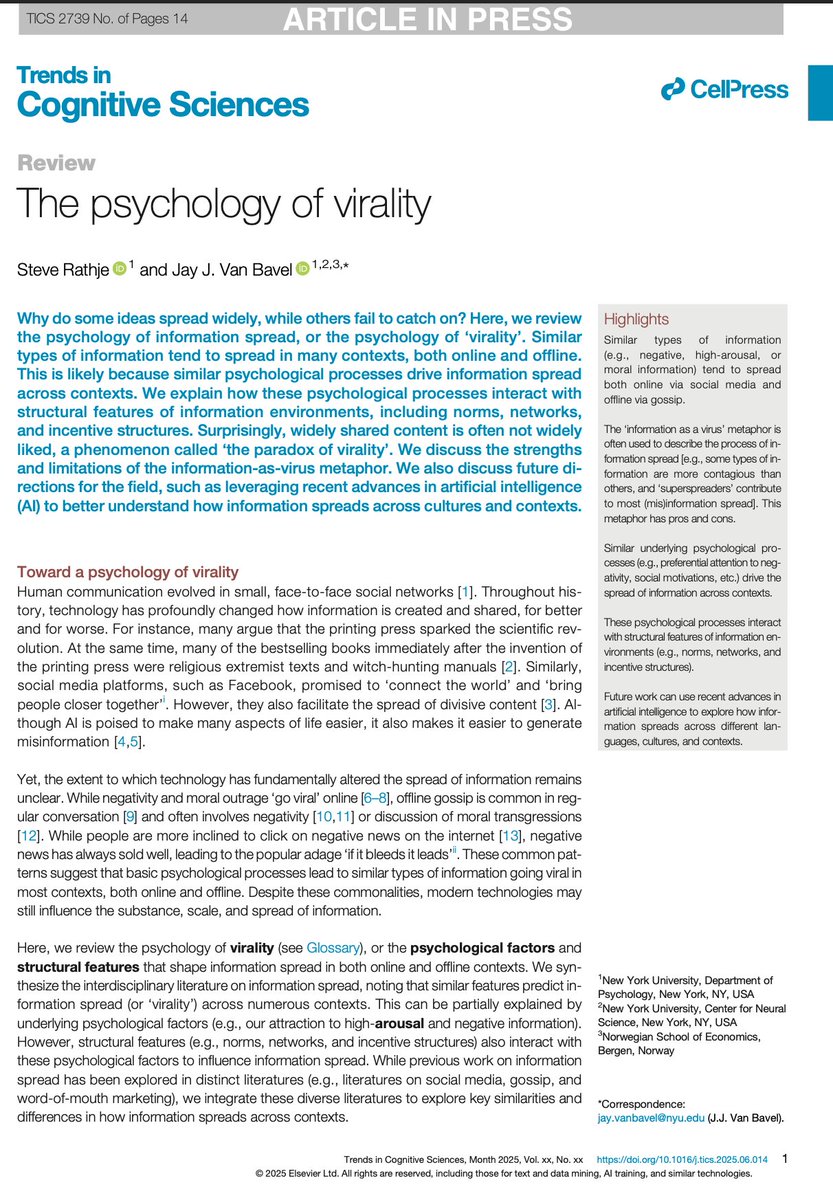
Jay Van Bavel, PhD
@jayvanbavel
Psychology Prof @NYUPsych | Author of @PowerOfUsBook (http://powerofus.substack.com) | Director of NYU Center for Conflict & Cooper | Keynote Speaker @TheLavinAgency
The Big Five test is about twice as accurate as the Meyers-Briggs test for predicting life outcomes, placing the usefulness of the MBTI test halfway between science and astrology—literally. When we use personality tests that impose categories—like the Meyers Briggs or…

Is social media a failed experiment? Powerful @Guardian essay by @jayvanbavel explains how the tiny fraction of people who post malign content are vastly overrepresented in our feeds, warping our moods, beliefs, behavior, and understanding of each other. theguardian.com/books/2025/jul…
I have a new paper on "The Psychology of Virality" with @steverathje2 in @TrendsCognSci Similar psychological processes (eg preferential attention to negativity, social motives, etc.) drive the spread of information across online and offline: sciencedirect.com/science/articl…

New preprint! We developed new measurement tools to study moralization in ~2B X & Reddit posts and ~5M traditional media texts. Key finding: moralization increased markedly on social media from 2013-2021; more than traditional media; associated with multiple user dynamics 🧵👇
I just looked up hers and Angel Reese's salary - $80k a year??? How are they earning less than a Target store manager???? Tf
Caitlin Clark’s shirt: “I DESERVE NBA MONEY” 👀
This week we're turning to @jayvanbavel's piece in the Guardian. Backed by research, Jay reveals the distorting effects of highly divisive online accounts and offers insight on how we can reconcile the dissonance between a volatile virtual world and the everyday world around us.
“those with both high psychopathy and low cognitive ability are the most actively involved in online political engagement” This is something I’ve observed in many political arguments online!
A nice reminder of why online political arguments are pretty pointless and should be avoided. nature.com/articles/s4159…
A nice reminder of why online political arguments are pretty pointless and should be avoided. nature.com/articles/s4159…
TWCF grantee @jayvanbavel, @nyup, was part of a research group that used machine learning to what shapes climate beliefs and behaviors in 55 countries to help refine future models of climate change perception and action. 🔗 What they learned: nature.com/articles/s4416…
"perceiving high levels of economic inequality significantly undermines individual well-being across multiple dimensions of human flourishing" ow.ly/fXTV50Ws2fV via @physorg_com
Similar types of information (e.g., negative, high-arousal, or moral information) tend to spread both online via social media and offline via gossip. Check out our new paper on the “Psychology of Virality” in TiCS
🚨New paper in @TrendsCognSci 🚨 Why do some ideas spread widely, while others fail to catch on? @Jayvanbavel and I review the “psychology of virality,” or the psychological and structural factors that shape information spread online and offline. Thread 🧵(1/n)
🚨Publication alert!! Our WhatsApp multimedia deactivation paper is now "just accepted" at @The_JOP. @CSMaP_NYU has published a full thread summarizing the paper! Check it out below 👇🏽👇🏽👇🏽
In the Global South, WhatsApp is more popular than X or Facebook. New in @The_JOP, we ran a WhatsApp deactivation experiment during Brazil’s 2022 election to explore how the app facilitates the spread of misinformation and affects voters’ attitudes. journals.uchicago.edu/doi/abs/10.108…
🚨New paper in @TrendsCognSci 🚨 Why do some ideas spread widely, while others fail to catch on? @Jayvanbavel and I review the “psychology of virality,” or the psychological and structural factors that shape information spread online and offline. Thread 🧵(1/n)
Just up! HBR IdeaCast interview with me on Conflict Intelligent Leadership! hbr.org/podcast/2025/0…
The commodification of travel is now common on Instagram or TikTok. It’s a way to signal social class, cultural sophistication, and a cosmopolitan identity. And many people that this has completely ruined several vacation spots and other locations around the world. 44% of people…
Why does the internet feel more aggressive and polarized than everyday life? Because it doesn't reflect society; instead, it presents a distortion, a deliberately engineered one. In my work, I frequently analyze how systems shape human behavior, with social media platforms…
You can read my full essay in the The Guardian here: theguardian.com/books/2025/jul…
From political unrest to toxic air and social stress, the world around us can accelerate the aging process. Out today in @NatureMedicine: our work on how the environment seeps into health and makes us older 1/6🧵 doi.org/10.1038/s41591… @EricTopol @jayvanbavel @GBHI_Fellows…
Only a small % of people engage in toxic activity online, but they’re responsible for a disproportionate share of hostile or misleading content on nearly every platform Because super-users are so active, they dominate our collective impression of the internet…